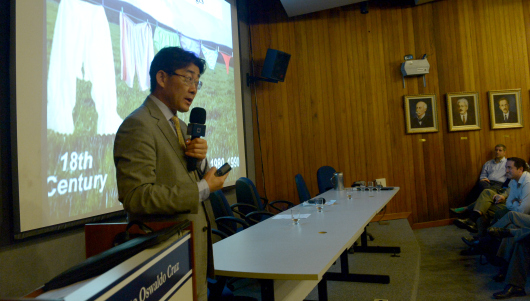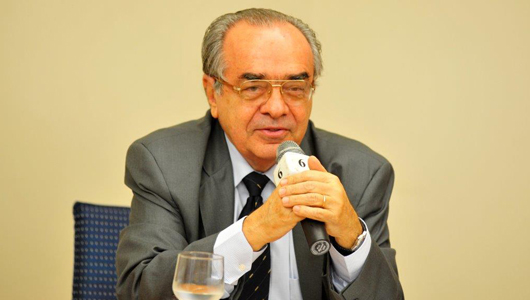Fiocruz and China discuss scientific cooperation agreement
28/07/2017
André Costa e Pamela Lang (CCS)
A delegation of health and genomics experts from China visited the Fiocruz campus in Rio de Janeiro, in the last week of June, to discuss future scientific partnerships between Brazil and the Asian country. In several appointments, meetings and lectures, the two parties discussed areas of mutual interest, getting closer to a scientific cooperation agreement.
In a special session jointly organized by the Oswaldo Cruz Institute (IOC/Fiocruz), the Center for Technological Development in Health (CDTS/Fiocruz) and Fiocruz Global Health Center (Cris/Fiocruz), on June 27, Chinese and Brazilian representatives shared their scientific findings on the zika and ebola viruses, and discussed possibilities for collaboration to control the re-emergence of other viruses and to anticipate new epidemics. Already on June 28, Chinese leaders and researchers from the Beijing Genomic Institute, Chinese Center for Disease Control and Prevention (BGI and CDC China, respectively), members of national bodies linked to national sciences, and representatives of Fiocruz discussed how to do this in a closed meeting.

The first event was attended by the Vice-President for Research and Biological Collections of Fiocruz , Rodrigo Correa, by the director of IOC, José Paulo Leite, by the former president of the Foundation and Coordinator of Cris, Paulo Buss, and by the former president of Fiocruz and director of CDTS, Carlos Morel.
In addition to stressing the strategic importance of the exchange of knowledge accumulated in infectious diseases between Brazil and China, aiming at a partnership for the next five to ten years, members of the round table discussion talked about enhancing the role of the countries that compose the BRICS (Brazil, Russia , India, China and South Africa) in the international scientific community.
“This collaboration is an opportunity to strengthen BRICS countries as an alternative to the more traditional group of research institutions in the United States and Europe," Paulo Buss said.
In order to reflect on the possibilities for cooperation in zika virus studies, CDC China officials George Gao and William J. Liu reported on the experience gained by the institution in Sierra Leone from 2014 to 2016, during the ebola outbreak. The responses to the crisis include the development of a platform capable of detecting countless viruses (zika, ebola, yellow fever, among others) and studies on the persistence of the virus in survivors.
Gao, who is also president of the Chinese Society of Virology and a member of the Chinese Academy of Medical Sciences, stressed the importance of cooperation between large global research institutions, under the concept “One World, One Health” launched by the World Health Organization (WHO) in 2008. The researcher considers that there are three core elements in the re-emergence of viruses: climate change, changes in human behavior, and the ease that viruses have to adapt to new hosts through genetic mutations. "That is why we need to work together and unite different sectors of society to control the emergence or re-emergence of viruses," Gao said.
To report the accumulation of knowledge of the zika virus gained during the epidemic that plagued the country in 2015 and 2016, including the recent study on the impact of the drug sofosbuvir on the replication of the zika virus, Patrícia Brasil and José Cerbino Neto, researchers from National Institute of Infectology (INI/Fiocruz), and Thiago Souza, from CCDTS/Fiocruz, were present.
Objective possibilities of cooperation were pointed out as a result of the meeting, including the possibility of joint studies on the evolution of the zika virus and its capacity to adapt to the host, on characteristics of immune responses between patients and survivors, and on the persistence of the zika virus, among others.
Partnership must move forward quickly, Carlos Morel says
At the meeting held on June 28, CDTS director Carlos Morel advocated that the partnership between the Foundation and Chinese health institutions must move forward in a fast and efficient way. According to him, once a first collaboration has been established as "proof of concept" it will be possible to think about long-term measures.
“We should take one step after another. To begin with, we can install one or two genetic sequencing machines in one of our labs, and then evolve from there," Morel said. "We can act very quickly. We can donate some machinery, some space and funds to bring researchers from China. If we start early, we will prove we can work together, and then we can expand from there," Morel said.

According to Rodrigo Correa, Vice President of Research and Biological Collections of Fiocruz, the partnerships between Fiocruz and Chinese health institutions, if implemented, will lead the Foundation international cooperation to a new level, impacting national research on issues such as genomics, health of large populations, climate change and emerging and reemerging diseases.
“The Brazilian genomic system can be better inspired by what BGI did, better understand its business and development model, which can lead to new vaccines, drugs or just useful information in the future. They [BGI] made a very strong political decision to invest in the area, and today they compete at the same or higher level with the world's leading institutes. Even their machines are developed by them today," Fiocruz vice president said.
Paulo Buss emphasized how an agreement with China strengthens the presence of the Foundation in the Global South. "Our mission is to be present in Latin America, in Portuguese-speaking countries, and in the Global South such as a whole. We have a lot to contribute to Chinese institutions as a network of laboratories and close proximity to national public health schools," Buss said.
George F Gao stressed again that China is commited and interested in developing international partnerships. According to the researcher, the country's actions in cases such as severe acute respiratory syndrome (SARS) epidemics in 2003 and ebola in 2014 prove the country's ability to play a leading role in global health. "We have challenges and interests in common. We hope to have strong collaboration between China and the rest of the world, especially Brazil," he said.




